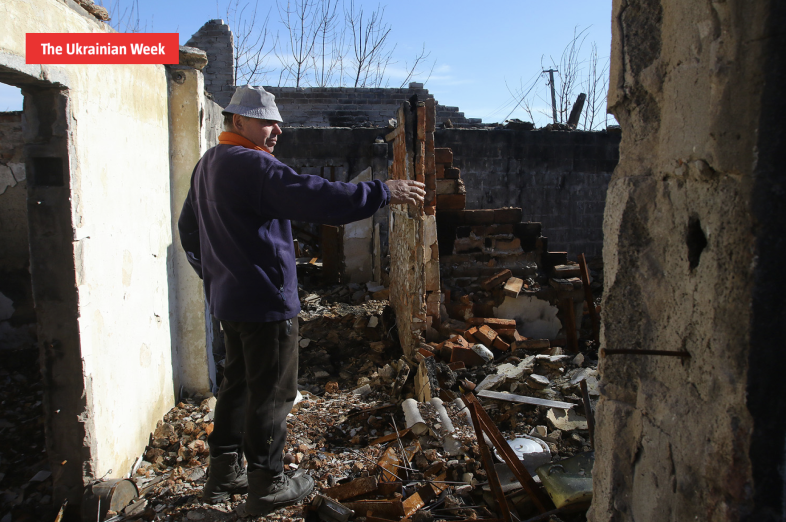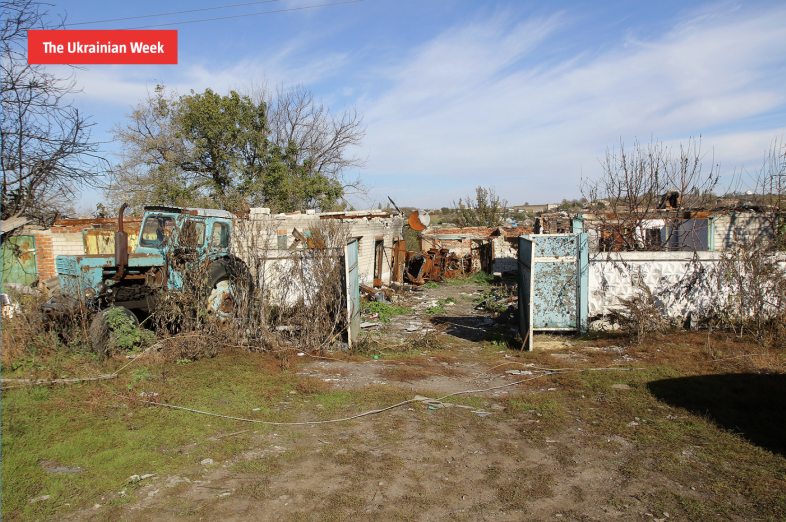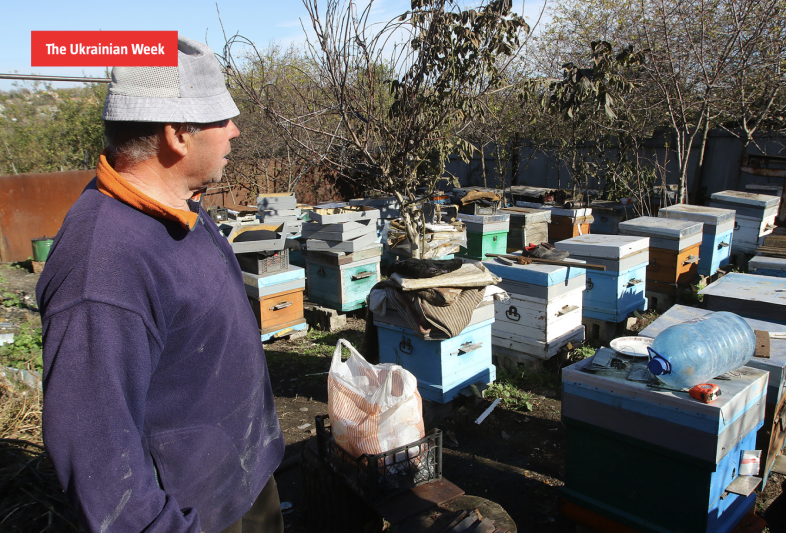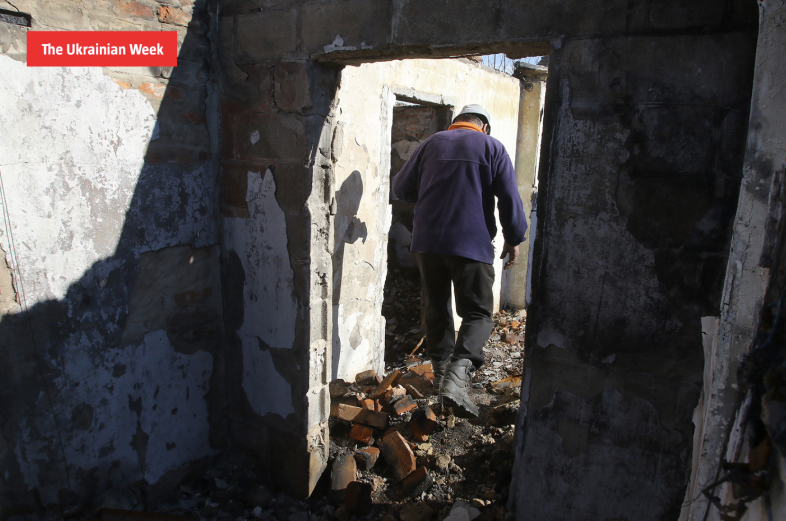Roman Malko, The Ukrainian Week/Tyzhden correspondent, visited a farmer from the Kharkiv region whose house was destroyed by the Russian occupation forces.
“This is my life now”, says a bewildered, burly man in an ostentatious Panama hat covering his eyes. He stands in the midst of a bombed and completely scorched yard, barely holding back his despair and tears. Out of all his possessions, only the apiary has partially survived; some several dozen beehives miraculously withstood the infernal blaze.
“This was my parents’ house,” he says. “Please, forgive me for being emotional. My family was growing, and I expanded my home. I invested all my energy here, my entire life”. The man can’t hold back his tears; a lump rises in his throat, but he continues. “We had some big plans,” he says, “I retired, and to make my life better and more joyful, I’ve decided to look after the apiary. Of course, to the delight of my children and grandchildren, who always came to help me. Everyone helped. The young and the old – everyone worked. It’s not like one person was working and the other wasn’t. We would all go to the garden. I would go first, my wife would follow, then our four girls behind us, and then the grandchildren. We would dig the potatoes. You would pull the weeds, lie near the cherry tree, and when we called for you, you would bring water. Then I would go to the market, sell potatoes, and buy treats for everyone. Everyone would wait for me. Even the dog and the cats waited for me to return home. And that is how we’ve lived our lives until February 24, 2022, when these Russian scumbags arrived”.

Photo: Roman Malko
The owner of this ruined estate is Viktor Fedorovych Ryeznikov. He was born in 1955 and presented himself as a Ukrainian. He used to work as a physical education teacher at the local school. He insisted he had no intention of fleeing from the Russian occupation forces. This courtyard in Novy Burluk, a small village in the Kharkiv region, was his entire world. Where would he escape? “In the end, there wasn’t enough time to flee anyway. The war began at four o’clock in the morning, and by half-past three in the afternoon, they [Russians. – ed.] already stood right here on the street,” says Viktor. “Russian vehicles were everywhere. On 24 February, Russian military equipment just kept coming—one column, and another, a third one. Columns, tanks, armoured personnel carriers, and refuelers kept arriving. How could you leave? Where would you go? For three days, the chaos was terrible”.
On the second day of the war, when his daughter and son-in-law went to the other end of their village, Russians fired at them from a tank machine gun. Russians shot at their feet, and they fell, only to get up and get shot at again. They were not allowed to move around, Viktor explains. But after the Russian columns passed, the village suddenly fell silent. There was a month without any authority. Then the DPRs [members of the Russian-backed militia in a Russian-occupied Donbas region – ed.] appeared.”I am the commandant; we are here to restore order,” Viktor recalls one of them saying. “These scoundrels are traitors carrying Ukrainian passports”, he adds.
Novy Burluk is an ancient village. It was originally founded in 1695 when these territories were settled by Ukrainian Cossacks and peasants from Ukrainian territories of the Dnipro’s Right Bank, which was devastated and ravaged by endless wars. The village is not far from the road leading towards the Russian border. However, it is hidden in ravines and the river valley, so the Russian occupiers turned it into their rear base. On one side of the village, they lived and kept their equipment, and on the other, they came to ‘rest and relax’. Fearing for their safety, Russians prohibited the locals from leaving their yards and using mobile phones. Soldiers immediately started searching through houses, looking for the members of the Ukrainian military (it seems like they had their lists prepared in advance). Otherwise, they went from house to house, simply looting.
“I figured that they were allowed [by their superiors – ed.] to come here, walk around, relax, loot, and steal”, Viktor says. “Door to door, they went through the entire village. They searched everything, all cabinets and attics. If they found a phone charger or a box, they would immediately ask: “Where is the phone?”. If you didn’t give it to them, they would beat you up. And they took people’s cars to ride around. They had a bathhouse. They grilled meat, used banya [a Russian steam room – ed.], and overall had a great time”.
Russian soldiers soon knocked on Viktor’s door as well. One morning, the doorbell rang – three armed men were standing outside. When Viktor went to open up, Russians pushed him aside and silently entered the courtyard. They behaved harshly and arrogantly. “Military ID, passport, phones,” said one of them, wearing a mask, “Do you have any weapons?” he asked. “Yes,” Viktor replied, “It is legal and officially registered; it’s in the safe.” “Show it,” ordered the Russian. Viktor showed him the safe, the shotgun, and the documents. For a while, the Russian occupier simply stood there, struggling to read the papers written in Ukrainian. “What are you giving me? I don’t understand any of those!” shouted the soldier. “Well, that’s how it is for us,” Viktor recalls. He continues his story:
“We’re confiscating the weapon,” said the Russian. “Alright, but who are you?” I asked. “Can’t you see?” “Well, I see that you are military,” I said, “I see that you are armed, but according to the law, if you are taking away the shotgun, you should give me a receipt because the weapon is legal and registered”. For a while, the Russian soldier remained silent and then said, “I can sign you a receipt on your back with a knife right now”. “Yes. You can”, Viktor answered, “but you are a normal person, and I don’t demand anything illegal. You are a military man; you know how to handle weapons; you know how it’s registered”.

Photo: Roman Malko
The increasingly tense situation was suddenly saved by a short Buryat who ran into the house. “Listen”, he shouted to the Russian soldier who wanted to confiscate Viktor’s shotgun. “They are russkiye [Russians – ed.]”. “You see, my wife is from Kamiana Yaruha”, Viktor explains to me; it used to be a Russian settlement. “They must have already spoken to her, and she told them this is where she was from”. In the Kharkiv region, there are many so-called ‘Russian’ settlements which were founded in the 17th and 18th centuries. Initially, they were established by the Russian Tsar’s decree to protect the Moscow Tsardom’s southern borders and, later, to ‘dilute’ the ethnic Ukrainians in the region. Most of the newly founded villages were populated by Russian migrants from the central, southern, and even northern regions of Muscovy. Most of the residents were not serfs; they were considered ‘state people’. Over the centuries, living in the Ukrainian environment, they became somehow Ukrainianised. Not too much, though. These settlements often remained islands of the so-called “Russian world” in the Slobozhanshchyna region, serving as a living testimony to Russia’s systematic colonisation policy towards the subjugated nations.
But let’s return to Victor’s story about unwelcome guests. Upon hearing that Viktor and his family are ‘Russian’, soldiers noticeably softened up. The conversation shifted to a somewhat more normal level. It turned out that the guys who came to ransack Viktor’s estate were only twenty, twenty-two, and twenty-four years old. They were artillerymen. Initially, they were sent from Belarus to Kyiv region, to Bucha, but on the very first day, they were completely defeated there. Then, they were re-armed and dispatched to the Kharkiv region.
“After talking to you, I realise that you are educated people, officers, perhaps”, Viktor Fedorovych recalls telling them. “Guys, why did you come here? What for?” Viktor asked them. “Why are you here? You should open up a business, start your own family, provide for them, and live like normal people. Even though, as you may see, I live in the village, I have hot and cold water, there is a boiler in my house, it’s clean and tidy, and the repairs are done properly. I live like a human being. How about you? How do you live?” They shook their heads, “we don’t have that”. “Where are you from?” Viktor asked them. “From Transbaikal Region in Russia.” “And you?” the old man asked another soldier. “I’m from Chita”, the Russian replied. “In our area, there’s one city, and within a radius of 100 km, there is nothing. There is nowhere to work. Any work,” he says. “It used to be good during the Soviet times; there were collective farms and more work.”
Viktor chatted with them and then led them to the apiary. “Oh, you have such beehives”, Russian occupiers were surprised, “our honey is very expensive.” “So work for it”, Viktor told them, “if it’s expensive, work, sell honey.” “But no, you don’t understand; we don’t have that. This is not like that for us at all. This is not how things are done [back home in Russia. – ed.]. We don’t live like that.” “Well, guys,” Viktor told them, “this is how we live. We used to live until you… Tell me, why did you come? Who are you looking for?” “Well, we want to liberate you from the Nazis.” “Tell me,” Viktor asked, “what does a Nazi look like? Explain to me, how do you look for them?” “Well, who knows…” the Russian was confused. “Well, there you go…” replied Viktor.

Photo: Roman Malko
By the end of spring of 2022, the situation in the village had worsened. Not only because the commandant, a drunkard and a bandit with his gang, behaved more and more arrogantly towards the locals. The Russian occupation troops began firing artillery directly from the village without even changing positions. “They stood on that edge,” Viktor says, “shooting in this direction, and that, and there, absolutely haphazardly. The echo went throughout the village. Day and night, mornings and evenings, all the time. It was such a horror”.
“And then the ‘response’ comes from the Ukrainian side. I only saw it all from the side. I don’t know how our guys on the front line endure it”, Viktor explains.
When Viktor and his wife were almost hit by shrapnel once again, the woman suggested that they finally leave. “I can’t take it anymore,” she said, “it’s such a fear every day, don’t you understand? At night, when they shoot, you don’t sleep, thinking where it landed. Well, let’s go then,” Viktor said, “we’ll leave.” At that time, the occupiers supposedly opened a green corridor through the destroyed dam on the Pechenizke reservoir,” explains the old man. “However, they only allowed the elderly to pass, not the young ones. So, to leave, the young ones devised a simple scheme: they would take two pensioners with them in an old car, one that doesn’t matter, and drive them to the checkpoint. If they’re lucky and get through, they take them as close to the dam as possible, leave the car, and cross from the occupied territory to the Ukraine-controlled territory”.
Using this scheme, the man and his wife managed to leave only on the third attempt. “The first time we went – they don’t let us through,” Viktor says. “The second time – a convoy of over a thousand cars gathered – couldn’t get through. I asked the Russian who was letting people through – how can we leave? He said, “Come at five in the morning to be the first one. The first 5-10 cars will be allowed through”. But when Viktor and his wife arrived for the third time, the Russian occupation forces announced that all those willing to enter Kharkiv must turn back to Shebekino and travel through Russia. This essentially meant leaving through Russia and the Baltic countries. Viktor’s wife pleaded, cried, fell to her knees, and so the Russians finally let them through. They reached the dam, left the car, and crossed into Ukraine-controlled territory. “It felt completely different,” shares Viktor, “as if we returned home and stepped into freedom, at last.”
Viktor and his wife loaded their belongings on a bus and headed to Kharkiv. “I packed a bag,” the old man recalls, “even though they said not to take anything, there was apparently only one seat; they [Russians – ed.] won’t let us through; we could buy everything we need in a second-hand shop later, we were told. But what did I have to lose? I had nothing left, and winter was coming. So, I took whatever I could. It was June, but I even put on a fur coat on top. Well, they let me through. Maybe I was lucky, but they didn’t throw away or even check our things”.
However, as soon as the family left their yard and the drunken commandant was sure they wouldn’t return, the Russians rushed to loot the house. Local collaborators also joined them. It was a traditional procedure. They robbed everyone who fled the village. Viktor thinks that one of the main reasons why his estate was burnt down is because looters wanted to wipe off the traces of their crime. He is convinced that this was not done without the help of some locals who collaborated with the Russian occupiers, and after de-occupation, they continued to live in the village.
“My family will take care of me”, Viktor sadly says, “My children are good people. They all have their own families, they are educated, they have their own houses, and they work. They tell me, “Dad, sit, read, here’s food for you, a car for you, everything for you”. But it’s theirs… And I have nothing left… How can one live like this? Why did fate treat me this way? I lived my life honestly. It shouldn’t have happened this way…”. Viktor explains that when he first arrived and saw what his yard had turned into, cold sweat ran down his spine. He walked around the yard, went to the apiary, strolled through the garden, and turned around. He didn’t want to go anywhere. He was ready to live on those ruins. He says he accepted it: “My soul aches, but I think to myself – this is war. We’ll blame it on the war…”.
It’s not that simple, though. Viktor felt the need to talk to someone; he spent several hours walking us through the burnt walls, through the debris of bricks and plaster, narrating stories of his life, sharing his dreams and plans, and showing what they had turned into. This was perhaps the scariest tour of my life—a tour through the ashes that until recently had been someone’s island of joy and happiness.

Photo: Roman Malko
“This is my whole life. Here are the apple trees and the new grafts. Here is my son-in-law, when he married my daughter, earned money, bought a car, brought it and parked it here. Let the father-in-law have it. And here was the parental house where my wife and I lived. I have four children; the family grew. We were happy. Let’s expand a little bit more, we thought. This room would be for me, and that one for you. That’s what we did. The children grew up; they got married. The house was huge, and it was just the two of us. Well, so what? The kids come, everyone has a place to sleep, and I’m happy”, Viktor explains.
“The hallway was over here. Here we had the hall – the TV, the sofa; here was the shower. Everything was tiled properly. We had a coffee table over there and a shelf full of books. I thought I’d read a bit during my retirement. And here, I used to sit at the table, open the curtain, and bees would fly at me. There was a bedroom here; I made sofas for the kids, and there was a computer. Another bedroom, a new wardrobe was here. My wife and I did the repairs together, slowly. I made these partitions with my own hands; it’s so expensive, damn it. I made a good table, a solid one. I made good benches; I repaired them to keep them bright and clean. I thought when spring comes, the grandchildren will come, and the grandpa will show off his mastery. I fed my grandchildren here. We would sit at the table and enjoy. We would cook porridge with my grandchildren. Well, you have to make sure they remember their grandpa. We’d make porridge in a 20-litre cauldron, add some fresh bacon, then I’d say, “Let’s eat now, you cooked it yourself. Two portions each”. My granddaughter once said, “Grandpa, it’s good that you taught me how to cook porridge; once, I had to do it, and I know how.'”
“This is how I lived. I did everything with my own hands; I had everything. I was ready to retire. They say being a beekeeper is hard work, but if you organise it correctly, it’s easy. You see, everything is in order here. We stored the bees here in winter. There was a winch. We brought the beehives on a cart and pressed the button; it lifted; pressed it again — it lowered. My wife and I pumped honey together. I pulled out one frame, handed it to her, and she placed it in the hive. “We didn’t lift more than four kilograms because it was unnecessary. We took it to the location where I had a table set up for cutting and an electric honey extractor. I cut the honeycomb, placed it in the extractor, pressed the button, and it pumped out the honey. It stopped, and I replaced it with the next one. Working with bees gives you a sense of satisfaction. It’s beautiful. The job is good, but to truly understand it, you must live this way. Unfortunately, everything is gone. Nothing remained; the fire destroyed it all. This is what the bloody war leaves behind – pure destruction and devastation.”
Viktor falls silent. His eyes fill with tears again. “I cry all the time,” he sighs. “Maybe it’s not manly, but it’s human. But you have to love your life,” he says when we bid farewell. “And don’t forget to exercise to stay fit and healthy”, he smiles. “I’ve been exercising all my life – for myself, for my health”, says Viktor. “Come visit me for sure, preferably in spring when everything comes to life again and the apiary wakes up”.

